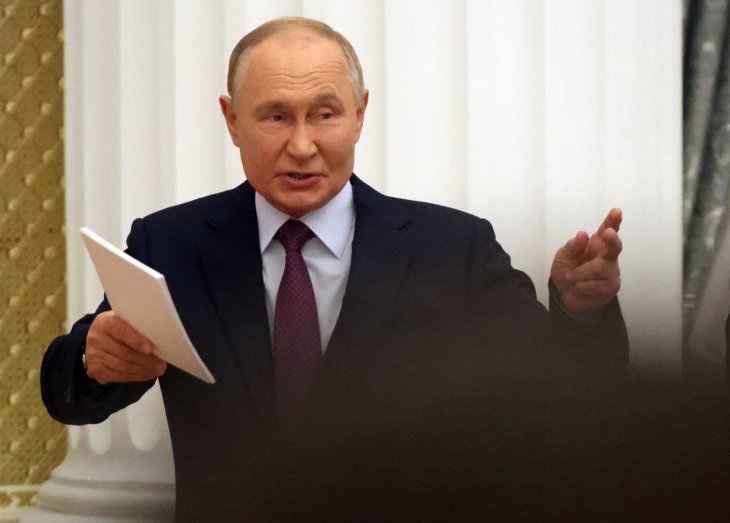
Russian President Vladimir Putin announced neither surprising nor radical revisions in Russia’s nuclear doctrine on September 25 (Kremlin.ru, September 25).

President Vladimir Putin in Moscow 25 September 2024. Photo: Getty Images
He committed to revising the government’s vague document back in June. In the ensuing months, many “patriotic” pundits have advocated various drastic changes, from formalizing the “escalate-to-deescalate” proposition to breaking the non-proliferation regime (see EDM, June 3; Kommersant, September 11).
Putin opted for very modest revisions and tried to compensate for this moderation with staged gravitas at his Security Council’s so-called “standing conference on nuclear deterrence.” The conference had never been known to exist before but this time was covered on prime-time television (Kommersant, September 25; Meduza, September 26). The announced shifts in the justifications for Russia hypothetically resorting to using its vast nuclear arsenal have already been scrutinized minutely, but the timing of Putin’s heavy hints and direct threats is indicative of his real intent.
Typically, Putin’s attempts at brinkmanship are aimed at influencing key decisions in the US-led coalition on expanding support to Ukraine and providing weapon systems of higher capacity, such as Leopard main battle tanks or M142 HIMARS multiple rocket launchers. The physical arrival of these arms, such as the deployment of the first squadron of F-16 fighters in early August, is invariably ignored, even when equipped with the JSOW glide bombs (Izvestiya, September 26).
Putin’s previous surge of nuclear rhetoric was timed to coincide with a meeting between US President Joe Biden and UK Prime Minister Keir Starmer that focused on whether to grant Ukraine permission to use the Storm Shadow air-launched missile to strike targets deep in Russian territory (Interfax, September 14; see EDM, September 16). The doctrinal revisions were announced as Ukrainian President Volodymyr Zelenskyy held meetings with Biden, Vice President Kamala Harris, and, perhaps most importantly for Moscow, former US President Donald Trump (Rossiiskaya Gazeta, September 27). An upcoming meeting between Biden, Starmer, German Chancellor Olaf Scholz, and French President Emmanuel Macron will likely invite new threats from Putin (Izvestiya, September 25).
Moscow has rarely responded to long-distance Ukrainian strikes with enhanced nuclear saber-rattling, even to strikes of such spectacular impact as that in Toropets, Tver oblast, which caused the destruction of a major artillery arsenal (Current Time, September 19). The shocking offensive by Ukrainian troops into Kursk oblast, which is still ongoing despite Putin’s order to push the “bandits” out of Russia’s territory, has also seen no nuclear reaction (see EDM, September 3; The Insider, September 27). Kyiv is keen to take advantage of Russia’s self-restraint for demonstrating the hollow symbolism of Putin’s “red lines,” to much consternation among Moscow’s hawks (Meduza, September 23; see EDM, September 25). New boundaries drawn in the revised Russian nuclear doctrine will surely be breached without delay by the ways and means that would yet again catch the General Staff by surprise (Carnegie Politika, September 26; NV.ua, September 27).
Disconnected from the battles in the kinetic war, the ups and downs in Russian brinkmanship show a distinct correlation with Ukrainian peace offensives. Zelenskyy’s first peace summit in Bürgenstock, Switzerland, on June 15–16, 2024, saw not only a furious Russian diplomatic campaign of sabotage but also an escalation of nuclear rhetoric, most notably at the St. Petersburg Economic Forum (Fontanka.ru, June 7; Forbes.ua, June 18; see EDM, June 20). This time, Putin’s posturing aimed to disrupt Zelenskyy’s address to the UN General Assembly centered on the proposal for the second peace summit (Kommersant, September 25; RIAC, September 26). Moscow resolutely rules out any possibility of participating in this summit, but may have difficulty derailing it, as India has begun to cautiously signal its interest in hosting the summit (RBC, September 21; NV.ua, September 24).
The resonance of rhetoric decrying nuclear threats among countries in the Global South is clearly a major concern for the Kremlin, as it is constantly on the lookout for opportunities to spread its influence in other parts of the world (Russia in Global Affairs, September 1). The official recognition of North Korea’s nuclear status, necessitated by Pyongyang’s readiness to sustain the supply of artillery shells to depleting Russian stocks, is upsetting for many stakeholders in the global nuclear non-proliferation regime (The Moscow Times, September 26). Russian leadership grants extraordinary importance to ensuring the success of the BRICS (a loose political-economic grouping originally consisting of Brazil, Russia, India, China, and South Africa) summit scheduled for October 22–24 in Kazan, Tatarstan. These strategic calculations could compel Putin to tone down his nuclear saber-rattling in the couple of weeks preceding the gathering (RIAC, September 25).
The key to the BRICS summit’s success is held by China’s President Xi Jinping, who confirmed his intention to partake but has signaled his disapproval of Putin’s cavalier attitude toward nuclear matters in various subtle ways (RBC, September 12). Beijing is promoting the proposition for an international treaty prohibiting the first use of nuclear weapons. Russia’s revisions to its nuclear doctrine do not fit with this initiative (RIAC, September 27).
Experts in Moscow evaluate China’s displeasure with the utmost attention and tend to conclude that it will remain superficial so that no negative consequences for the evolving strategic partnership are to be expected (Rossiiskaya Gazeta, September 26). Such opinions are underpinned by the assessments of China’s sustained efforts at strengthening its own nuclear capabilities, including the recent test launch of an intercontinental ballistic missile (Kommersant, September 25). The Russian program of such tests has been significantly curtailed, and the explosion of the RS-28 Sarmat missile in a silo at the Plesetsk Cosmodrome in the Arkhangelsk oblast is a significant setback, about which the Kremlin remains in denial (Meduza, September 25).
Putin’s nuclear brinkmanship follows an oscillating pattern. The announcement of revisions in the nuclear doctrine is supposed to mark an upswing in Russia’s attempts at nuclear coercion. The Kremlin hopes that these revisions will reinforce Western fears of Russia’s nuclear capabilities to influence the proceedings of the Ramstein format meeting. An ensuing pause in nuclear rhetoric timed for demonstrating responsible statesmanship on the eve of the BRICS summit is also reasonably predictable.
The sequence of Ukrainian long-distance strikes is set to continue, but these increasingly spectacular hits—whether by domestically produced or Western-supplied weapons—will make little difference in Russia’s nuclear maneuvering across the political space of the long war. Like every aging autocrat, Putin is highly egocentric and cannot comprehend that his blatant blackmail makes it impossible for Western leaders to yield.
Source link







